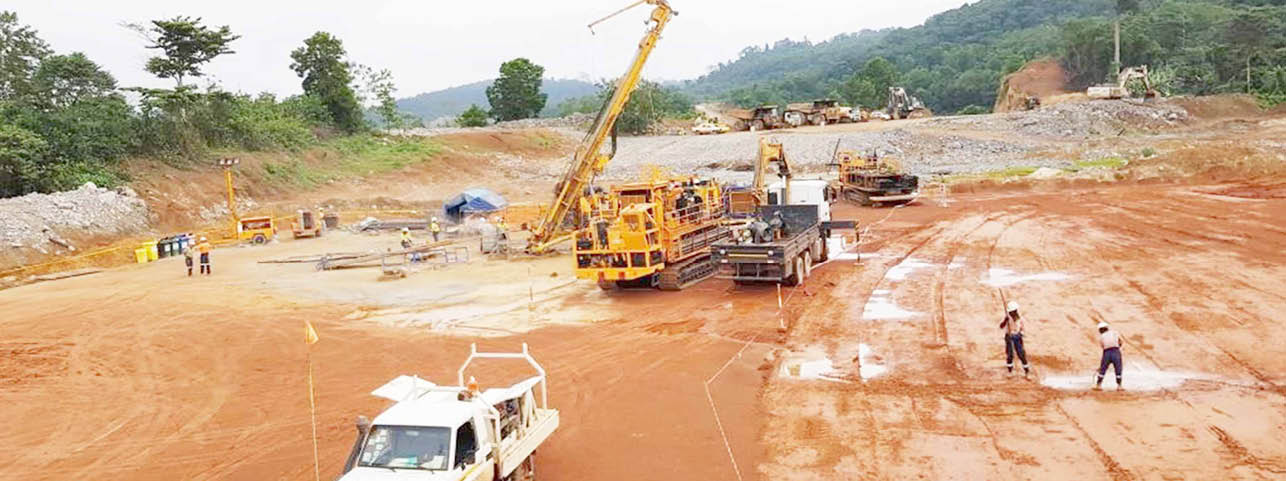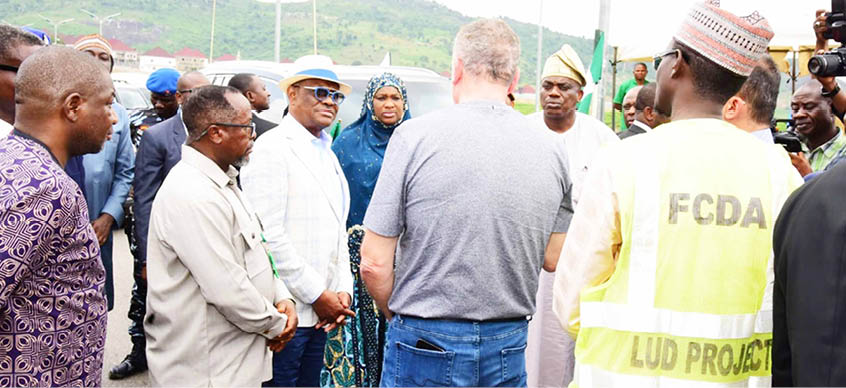Many FCT projects stalled by contract variations
With many stakeholders in the FCT are wondering why many road, water, housing, drainage, among other contracts, were abandoned. Our correspondent unravels some of the reasons. There have been growing concerns by many stakeholders in the FCT over the swelling rate of contract sums variation for projects in the territory, with many attributing it to […]

Site of Wassa housing project
With many stakeholders in the FCT are wondering why many road, water, housing, drainage, among other contracts, were abandoned. Our correspondent unravels some of the reasons.
There have been growing concerns by many stakeholders in the FCT over the swelling rate of contract sums variation for projects in the territory, with many attributing it to the growing number of abandoned projects in the nation’s capital.
Even the new minister in charge of the territory, Nyesom Wike, is worried about such practice, saying it is responsible for over 100 uncompleted projects in the territory.
The minister singled out officials of the Federal Capital Development Authority (FCDA), which is the projects execution arm of the FCT Administration (FCTA), blasting them for allowing such, which, according to him, is embarrassing and inimical to developmental projects.
The North is no more – General Lekwot
FG to replicate arts, culture villages in 36 states
Investigation by our correspondent revealed that there have been contract sums variations in projects like the Wassa Housing Infrastructure Project and the Dutsen-Bwari-Jere-Gurara road.
For instance, the proposed Wassa project, which is located at the edge of Apo District, was expected to be developed by a private developer, with the FCDA providing the land and infrastructure. The developer was expected to in turn sell the two-bedroom flats to the “common man” at N7m each.
After the agreement, the FCTA, through the Satellite Towns Development Department, awarded the infrastructure project in 2014 at N26bn, but it was revised and jerked up to N85bn four years later in 2018.
Mr Olusegun Olusan, acting Coordinator of the Satellite Towns Development Department, said so far the administration had paid N21bn to the contractor, with a balance of N64bn, with 21.4 per cent work done.

Our correspondent, who was at the site of the project, observed that apart from the single lane road that extends from the Apo Mechanic Village, nothing much is on ground.
The project has been delayed for nine years and still counting, which Mathew Oyewole, a civil engineer, attributed to the officials’ attitude of constant reviewing of contract sums.
The minister himself was not happy when he visited the project, warning that the FCT would not be awarding contracts for awarding sake.
He said, “We will award contracts that we know we will finish before embarking on another contract.
“Every contract is abandoned because there is no money. So, we are going to look at everything.”
Also, the minister said he was not impressed with the arrangement made by the FCTA, asking why should the government spend N85bn to provide infrastructure, land and benefit nothing from it?
He said, “We are not impressed with the arrangement made by the FCTA. Government cannot just cough out N85bn in providing infrastructure and then give land out to private developers who will build and sell.
“This kind of arrangement is not commendable at all. We think that the government must also participate, having provided the land and infrastructure.
“If we are partnering with private individuals or developers, the common sense is that you provide the land, provide infrastructure and they come and develop.
“Then, government, for example, can take 10 per cent, then the developers take 90 per cent, depending on the value.”
Wike noted that under such arrangement, the government would be able to determine the price the houses would be sold to the masses, saying that the masses could not afford N7mn for a house.
He said the project would be revisited for proper planning in a way that the government would benefit from it and ensure that the masses that the houses were being built for could afford it.
Dutse-Bwari- ere road raised from N20bn to N50bn in 3 years
There was the same contract sums variation on the Dutse-Bwari-Jere road, which was awarded in 2017 at N20bn, and in 2020 the contract was revised to N50bn.
The FCDA reportedly paid nearly N50bn for the contract, with the balance of about N900m.
Wike, who also inspected the road, confirmed that what was left to pay the contractor was about N900m.
He said the project was about 90 per cent but that the contractor said that the amount could no longer finish the project; apparently requesting another contract sum variation.
Minister blasts FCDA over variations, fumes at work in Usuma Dam
Wike also complained of so many variations in contract amounts being handled by the FCDA, which he described as “worrisome”.
He said, “I have never seen a thing like this in my life. What we see in FCDA contract variations from N10bn to N119bn and from N50bn to N200bn is alarming, and I am not going to accept this.”
The minister was also not happy when he visited the ongoing rehabilitation and expansion work at the Lower Usuma Dam Water Plant located in Ushafa in Bwari Area Council.
He said he was told that the project was awarded as an emergency contract but realised on getting to the site that it had not been awarded fully, noting that he just found out that what was given to the contractor was just a letter of intent in August, 2022.
He further said, “I knew the importance of this project in supplying water to our people within the city and its environs. Water is very important, and so I have directed that the project is no longer an emergency.”
He said the project would be re-awarded, adding that his office would supervise the procurement process and invite other companies to bid.
Why contract sums variation sometimes crops up – Contractor
An engineer with one of the contractors, who spoke with our correspondent on why there are variations in the contract sums, explained that current market reality was usually responsible, especially when there was payment delay from the contract awardees.
The engineer, who sought not to be named, said sometimes the government would award the contract on paper or by intent without mobilising for several months or years and yet that market prices kept changing.
He said, ”In such situation, what do you expect the contractor to do, of course, demand for variation to meet the current market reality.’’
He further said that no contractor would deliberately delay their work after receiving funds unless there was a problem coming from the awardee.
How we intend to address abandoned projects – Wike
On abandoned projects, the minister said they would be attended to one after the other, noting that the era of pursuing many projects at a time had gone.
He said already more than 10 of such abandoned contracts had been selected and approved for completion, adding that agreements had been concluded with the contractors.
He further said that the Executive Secretary of FCDA, Mr Shehu Hadi, had been directed to make sure that all the files approved since last week went to the Director of Treasury.
He added that he had directed all payments to contractors be made latest by Friday, September 10.
He explained that based on the tagging of each project to Internally Generated Revenue (IGR), each contractor would be paid a certain amount of money every month based on the agreed project completion period.
Wike said, “We agreed with some companies to deliver the projects in six months, and some 15 months.
“In fact, like the Millennium Tower, they (contractors) have agreed to finish it in two years’ time, and we are paying them N3bn every month.
“On Monday, we are flagging off the resurfacing of most of the roads in Garki, Maitama and Wuse, because the roads are terribly bad.”
